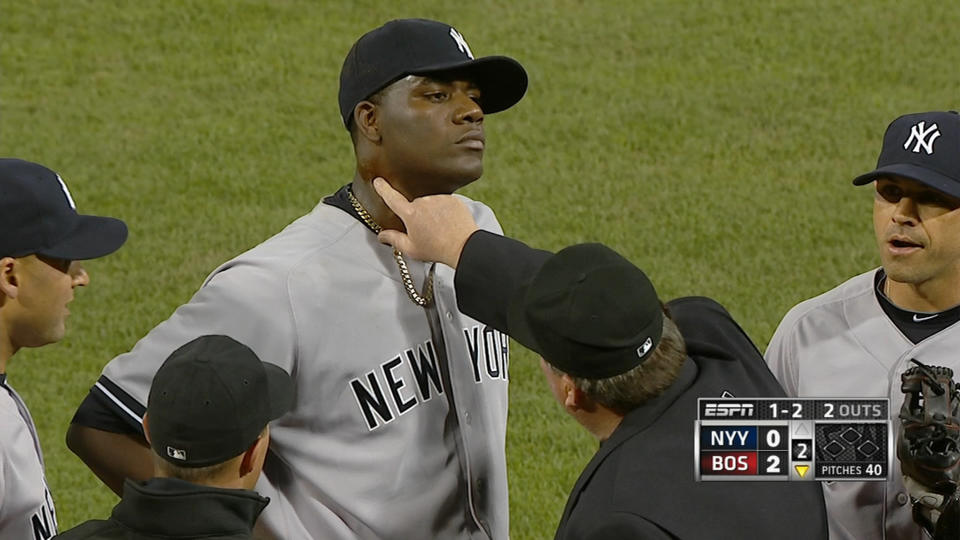Pine tar, Vaseline, spit all part of baseball
It's fair to suspect that Michael Pineda isn't the only pitcher trying a few tricks on the mound from time to time.
The Yankees pitcher was suspended for 10 games for having a glob of pine tar on his neck to rub on his hands to grip the ball on a chilly night.
Here are five reasons it's not that easy to crack down on pitchers willing to bend Rule 8.02(b), which bars them from having "any foreign substance" in their possession or on their body during a game:
IT'S EASY TO GET
Saliva, soap, Vaseline — and yes, pine tar — are all readily available. Pine tar is actually legal in baseball, but for hitters. According to the game's official rules, the bat handle can be covered with any material to improve a hitter's grip — as long as the substance doesn't extend past 18 inches.
INDIFFERENCE IN THE LEAGUE
Pine tar has rarely caused much of a stir unless its use is unusually blatant. Pineda was spotted with a brown gooey substance on his right hand in a game against the Red Sox on April 10. It was only after he took the mound Wednesday with an odd-looking streak on his neck — again against Boston — that the Red Sox asked an umpire to check him. Detroit Tigers manager Brad Ausmus, a former catcher, said Thursday: "I do think pitchers using pine tar isn't as big a deal as it's being made out to be. It's more about getting a grip."
IT'S EASY TO HIDE
Aside from constant, airport-style searches by umpires, it's hard to think of a foolproof way to prevent doctoring the ball.
In 1987, Philadelphia pitcher Kevin Gross was suspended 10 days after he was caught with sandpaper in his glove. That same year, Minnesota's Joe Niekro got 10 days for carrying an emery board and sandpaper in his pocket. But instances like that are rare — and even with all the cameras at major league games now, hiding a tiny object used to scuff the ball wouldn't be impossible.
STICKY SITUATIONS ARISE IN OTHER SPORTS, TOO
Baseball players aren't the only ones willing to go to creative lengths to get a grip.
England cricket captain Mike Atherton was caught on television using dry soil from his pocket to rub into the ball during a 1994 international between England and South Africa. He was fined and insisted he had been using the soil to dry his hands on a humid day, but acknowledged he had not admitted to having soil in his pocket when questioned by a referee.
Several international teams have also admitted to using candy to change the ball. Fielders suck on sugary candy and rub the saliva into the ball, creating a smooth and shiny surface. A shiny-scuffed ball would not behave the same as an untouched ball and in theory be harder for the batters to hit.
THERE'S A SLIGHT RISK, AND BIG REWARD
Pitchers — and batters, too — have been trying to get an edge for decades, but in terms of long suspensions and public shame, doctoring a ball or corking a bat doesn't seem to resonate in the same way as the use of performance-enhancing drugs. Some pitchers may still feel they have little to lose by trying an illegal substance on the mound. Pineda was suspended for 10 games while drug suspensions can be far longer.


